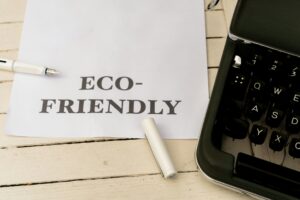Meeting consumer demands for “greener,” “sustainable,” and “climate-friendly” business practices carries some risks. Environmental groups and some states are targeting these statements and, in some cases, bringing legal action. Consumer-facing statements about green-related efforts require some caution. This also includes US companies doing business in Canada.
Environmental Group Sues Rust-Oleum Corp. over Green Claims
In Bush v. Rust-Oleum Corp., a federal judge in California gave final approval to a proposed settlement resolving a class action lawsuit against Rust-Oleum regarding certain green marketing claims.
Rust-Oleum’s Krud Kutter, a cleaning product, was labeled as “non-toxic” and “Earth-friendly.” Krud Kutter includes a number of different products, including adhesive remover, carpet stain remover, cleaner & degreaser, exterior metal cleaner, house wash, and several more.
Plaintiff’s counsel alleged that the claims by Rust-Oleum would “lead a reasonable consumer to believe that the products do not contain ingredients that are harmful to humans, animals, or the environment.” Their counsel also alleged that these claims are “misleading because the products contain multiple ingredients that are known to cause toxic effects” (Source: Verdant Law).
Rust-Oleum countered that the Federal Trade Commission’s Green Guides, “are not valid metrics of how a reasonable consumer interprets the terms at issue.” Rust-Oleum argued that no reasonable consumer would understand a “non-toxic” claim, together with a disclaimer that the products are skin and eye irritants, to mean that there is absolutely no risk associated with use of the product (Source: Kelley Dyer).
Rust-Oleum contended that the labels contradicted the plaintiff’s theory of deception: the phrase “Caution: Eye and Skin Irritant” is included next to the words “Non-Toxic,” and the rear of the products’ labels include a definition of the “Earth-friendly” claim.
According to a blog by Clark Hill, “Plaintiffs argued that consumers were likely to be misled by the prominent front-label claims, especially when compared to the less conspicuous technical disclosures on back labels or in online documentation. In support of their claims, plaintiffs pointed to the United States Federal Trade Commission (“FTC”) Guides for the Use of Environmental Marketing Claims (16 CFR Part 260 or the “Green Guides”), which provide examples of the FTC’s views on how reasonable consumers are likely to interpret certain claims.”
The federal judge ruled in favor of the plaintiff, and Rust-Oleum will pay $1.5 million to settle the lawsuit.

Environmental groups and some states are suing some companies over their Green marketing claims (Photo by Markus Winkler on Unsplash).
State of New York and Environmental Group Sues JBS over Net-Zero Claims
We reported in our blog on March 27, 2024, that the New York Attorney General, Leticia James, filed a lawsuit against JBS for climate-related claims. New York’s Attorney General announced on November 3, 2025, that this case has settled, and JBS will pay $1.1 million.
New Claim against JBS
On October 28, 2025, the environmental group, “Mighty Earth,” filed a lawsuit against JBS. The environmental group said, “We’re challenging JBS USA’s climate claims to be net zero by 2040 as false and misleading. The world’s largest meatpacker doesn’t have any credible plan to tackle a staggering 97% of the greenhouse gas emissions found in its meat supply chains.”
According to Mighty Earth, the JBS group targets only Scope 1 and 2 emissions but does not include reductions to Scope 3, which it claims represent 97% of its total emissions (Source: Just Food).
The Environmental Protection Agency defines Scope 3 emissions as emissions that are the result of “activities from assets not owned or controlled by the reporting organization, but that the organization indirectly affects in its value chain. Scope 3 emissions include all sources not within an organization’s Scope 1 and 2 boundaries.”
JBS’s chief sustainability officer told Reuters in January that its “net zero by 2040” goal was an aspiration, not a promise, although the company told Reuters in a written statement at the time that its climate ambitions were unchanged (Source: Reuters).
JBS has a page devoted to their “Climate Strategy” that says, in part, “We strive to reduce the intensity of Scope 3 emissions through collaborative efforts that deliver both environmental and economic benefits for our supplier partners.”
Companies Doing Business in Canada
If you do business in Canada, you should also be aware of the recent final rules relating to Greenwashing guidelines. The final rules in Canada pose a significant risk to companies. For example, to bring a claim against a company’s green claims requires “any six persons resident in Canada” who are not less than eighteen years of age and who are of the opinion that an offense is about to be, or has been committed. See our July 22, 2025, blog on our Canadian website.
More companies are committed to producing goods and services that are more sensitive to the desires of environmentally conscious consumers and that are, in general, more environmentally focused. While appreciated by many, some will look for ways to use these commitments to sue companies. Proceed with caution.
Environmental Advice
Dragun Corporation has assisted the regulated community with environmental compliance, assessment/remediation, and litigation support since 1988. If you need assistance with an environmental issue, contact Jeffrey Bolin, M.S., CHMM, at 248-932-0228, Ext. 125.
Alan Hahn drafted this blog. Alan has an undergraduate degree in Environmental Studies and completed a graduate program in Environmental Management. He has worked in environmental management for more than 45 years. He has written hundreds of blogs and articles. His published work includes Michigan Lawyers Weekly, Detroiter, Michigan Forward, GreenStone Partners, Manure Manager Magazine, Progressive Dairy, and HazMat Magazine.
Jeffrey Bolin, M.S., reviewed this blog. Jeff is a partner and senior scientist at Dragun Corporation. He is a published author, a frequent speaker, and an expert witness. His expertise in environmental due diligence, PFAS, vapor intrusion, and site assessments has led to projects in the US, Canada, and overseas. See Jeff’s Bio.
Follow Dragun Corporation on LinkedIn, X, or Facebook.
Sign up for our monthly environmental newsletter.
Principled Foundation | Thoughtful Advice | Smart Solutions
Established in 1988
